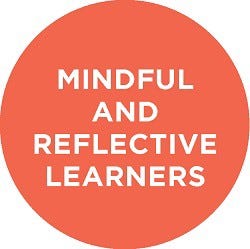Thriving Through Discovery
Gifted and talented students come from all backgrounds and walks of life and often have complicated learning styles.

“Persistence and comfort with productive struggle are skills that must be taught, built, and practiced like any other tool in a student’s academic toolbox.” — Katie Murphy
Katie Murphy is a gifted and talented resource teacher and National Board Certified Teacher at Bushy Park Elementary School in Howard County. She is a building representative for the Howard County Education Association.
Throughout all grade levels, some students tend to bubble up in one way or another during general classroom work. They may present with significantly advanced mathematical thinking or computational abilities or with high abilities in reading or writing in primary grades. Some are very strong in all areas; others show strengths in one, yet struggle significantly in another.
I’ve noticed in education the push to provide or sometimes require intervention programs for students who struggle in…www.edutopia.org
Gifted programs are essential for these students, as they need a unique learning environment that challenges them to apply their strengths while identifying and overcoming weaknesses. Left unchallenged, they often default to behaviors and attitudes that do not allow them to reach their full potential.
Creating an appropriate learning context is important for GT students, including the structure of the classroom. Advanced-level learners usually thrive and grow more readily through discovery-oriented tasks, which means organizing the classroom with spaces that allow for collaboration, discussion, and even motion. Learning to be mindful and reflective students allows them to fare better with challenging curriculum that encourages discovery options.

Creating a high level of interest in these tasks is also a must, as positive affect toward problem-solving, initial failure, productive struggle, and ultimate success during more unstructured situations is necessary.
Students who have a more negative affect toward such tasks may behave impulsively and show higher levels of anxiety.
Often GT students haven’t struggled to be successful when completing foundational computation tasks. They will frequently tell you that they just run the numbers in their heads. Many gifted students haven’t needed to show their thinking in the past. Persistence and comfort with productive struggle are skills that must be taught, built, and practiced like any other tool in a student’s academic toolbox.
As we help students build this set of reasoning abilities, and these abilities become stronger, students become more willing and comfortable tackling unfamiliar tasks that require more abstract thinking. To encourage this growth, I strive to create diverse situations that challenge children to grow both the assortment of skills that they use and their ability to work in a variety of situations.

Highly competitive students may struggle in collaborative settings, attempting to dominate and control the group, whereas those students who thrive in collaborative settings may struggle with the stress of competition.
Both of these learning styles need to be addressed by the GT team.
I work with my students to identify the strengths of their learning styles, to own their weaknesses, and to build both in order to communicate their ideas effectively in any situation.
GT programs are essential for meeting the needs of learners at the highest level of intentional thinking. At the highest levels, this means strategically choosing methods for task completion, modifying each approach as needed, and reflecting on the effectiveness of each strategy and the reasonable nature of each response. As students reflect on both successes and failures, they learn to monitor the effectiveness of each strategy, encouraging them to choose learning styles that increase success and surmount weaker skills.
These are life skills that lead to triumphs while allowing errors to occur and be overcome. Productive struggle and personal growth are what we want for all of our students to be successful, and gifted students often need unique experiences to fully engage their capabilities.

